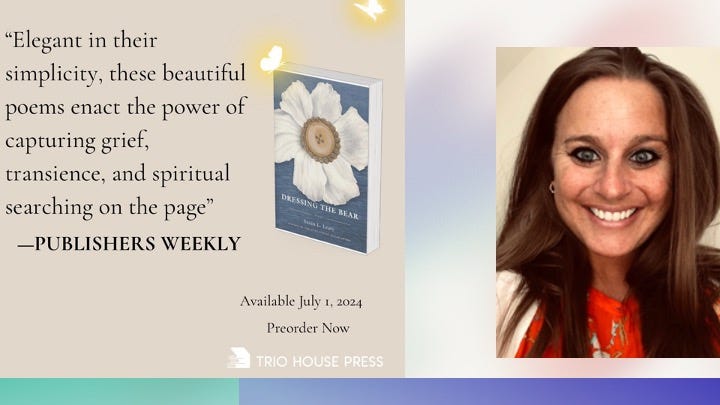Susan L. Leary’s Dressing the Bear is the winner of the 2023 Louise Bogan Award. A book length elegy for her brother, who passed away in 2020 by overdose, Dressing the Bear is a poignant meditation on grief, love and loss. I recently had the pleasure of speaking with Susan via email about her life and work.
1. Let’s start with some background for those who may not be familiar with you or your work. What did your path to poetry look like, and what is your newest release about?
I was first fascinated by poetry while taking an introductory creative writing course in college,but I didn’t take my own writing seriously until my late twenties, and somewhat accidentally, after learning of a death on my mother’s side of the family. In short, my mother never knew her father and was told by her mother (and my Nana) that he died of a heart attack in his sleep when she was only two years old. Fast forward fifty years to my Nana’s funeral, when a distant cousin approached my mother to let her know her father, in fact, died by suicide. I spent the next few years researching this part of my family history, which culminated in my first chapbook, This Girl, Your Disciple.
\Dressing the Bear is a book-length elegy to my brother, who died by overdose in September 2020, and the collection explores the themes of grief, loss, longing, love, and addiction.
2. How did Dressing the Bear find its home at Trio House?
As is true for many, I looked for presses that published authors I admire and respect. I am also quite choosy in where I send a manuscript (I don’t often submit to a lot of venues, either), and as funny as it sounds, I often need a symbolic or personally meaningful reason to submit my work.
In the case of Trio House, it was the name. My brother and my husband and I always called ourselves the perfect pair of three. A trio. So I submitted to the 2023 Louise Bogan Award, and Kimberly Blaeser selected my manuscript as the winner. Such a dream.
3. In addition to being a poet, you are a professor of creative writing. What is some advice you often find yourself imparting to your students?
I was a lecturer in English and Writing Studies for 15 years at the University of Miami, and after a move to Indianapolis last fall, I now teach in the same capacity at Indiana University.
As much as I’d like the advice I impart to students to be intellectual or creative in nature, teaching is an incredibly peopled phenomenon, so I tend to emphasize the communal aspect of a classroom and the communal aspect of life. People are everything, and the reason I love teaching so much is because each time I walk into the classroom, there’s the chance that some kind of magic happens between us—that we honor ourselves and the material—and when that happens, it’s the very best feeling.
But the thing is, my control can be limited in getting students to imagine the people around them as vital. They have to choose it. So I’m always encouraging them to find the social worth. These are always the best classes, the best relationships, the best experiences, the best moments: when there’s genuine chemistry, when people have fun and get along. So indulge others, I say. Humor them. Say yes. Believe others are operating in good faith. Love on others, love on their passions, their remarks, their work. Because intellectuality is a matter of human dignity and a matter of generosity.
4. Did the concept for this collection come to you fully realized, or did it develop over time? What was the process of creating it like for you?
When my brother died, I started writing, and I didn’t stop. The writing was compulsive for me, and I was writing from this raw, open wound. When I reflect on that time, I feel very distant, and not by choice, from the version of me that wrote those poems. That self is a mystery to me, and as much as I try, I can’t seem to find her.
5. There is a lot of recurring nature imagery (deer, lakes, birds, etc.) throughout Dressing the Bear. What makes this imagery such an important part of telling your brother’s story?
Nature was always a refuge for my brother. He was an avid fisherman, and he loved the water, the ocean, the beach, sunrises, sunsets, birds, the open field, the open sky. With nature, there is no compromise required on our part to belong. It lets us exist alongside it and welcomes us into its life, at least that is how my brother described it.
He really enjoyed being alone in nature, and though real solitude is almost impossible these days, he experienced it there. So much of who we are is linked to the perceptions and expectations others have of us, but in nature, perhaps the self is unburdened, or forgotten about, in a way that is self-affirming. We are our own audience. Or better yet, there is no audience.
This book, for me, is also a geography—an emotional landscape, yes—but even more so, a place for me to locate my brother in a very literal sense. I want so badly to believe in the afterlife, to believe in the soul, to be a faith-filled person, but my inability to comprehend my brother’s new whereabouts is a daily agony. These poems allow me to set him somewhere that is knowable, that I can continually return to, and the imagery of the natural world was instrumental in constructing this sense of place. And now that the book is a bound, physical object, it really has become a reliable little dwelling.
I should add that my brother’s phone screensaver was an image of a deer at sunup in a snowy, foggy field, raptly staring ahead. I wrote nearly every poem in this collection at my desk with a printout of this image and his prayer card just to the right of my computer screen, both my brother and that deer looking back at me.
6. You’ve spoken about how Dressing the Bear is, above all, a commemoration of your brother. Were there times in the writing process when his voice began to blend with your own syntactically or otherwise?
What really characterized our relationship was the way in which he and I were always talking, always communicating, and as I mention in the poem, “Blessing,” we spoke a private language.
We shared everything, and our relationship was easy in this regard. We also enjoyed shenanigans and had a playful, quick-witted banter. We would challenge one another to see who could keep up the joke the longest, who had the best comeback, who had the most innovative quip or interpretation or way of expressing a thought—really, who could get the other one to shut up first? So, that our words would continually spin and pool together is very true of our experience, and I believe we preferred it this way. Words, language, or rather a shared language, has always been at the root of our bond.
Throughout Dressing the Bear, I am also attempting to preserve my brother’s language—his actual words, his wisdom—to capture the singularity of his perspective because he was such a teacher to me. So much of what he said, I would just marvel at, and I don’t marvel easily.
7. Oftentimes, with elegiac poetry, there is a certain pressure to “accurately” represent the person you are paying tribute to. Did you ever experience thispressure, and if so, how did you combat it?
When someone we love dies, we’re left with many questions, but we’re also left with certainties. One certainty I have, and one I’m grateful for, is that I know my brother believes I would “get things right,” that I would “get him right,” in these poems. We talked about the possibility of this book because we talked about the possibility of his death, and as difficult as that was, he would often put his arm around my shoulder and say, “Sue, if you write a book about me, you’re going to write the shit out of that book.” That trust between us was, and still is, a great comfort to me.
8. Dressing the Bear is your fourth collection. What have you learned about publishing since your first book that you wish you had known sooner?
Time has taught me that my first impulses about writing—and what I wanted writing to mean in my life—were correct. I’ve always told myself publishing is secondary and what matters most is the writing, the activity of it each day, whether I corral one word or 1000 words onto the page.
The business of poetry—what of mine gets published where and when and why—I can’t trouble myself with that. I can only write and choose to believe poetry, language, art, etc. is valuable to my experience. I often ask myself why I keep writing, but four books later, I realize I continue to write poems because I like writing poems, and the simplicity of that truth is delightful to me.
I’ve also learned to celebrate the publication of a work. With my first two collections in particular, I barely spoke of them and truthfully, I was hesitant to share my work with others. I was hesitant to announce myself in any way. But there’s something deeply human in promotion.
There’s a vulnerability to it. You’re putting yourself out there, and people will be interested. They will rally around you. So don’t be shy about finding your audience. When you publish a book,it’s okay to say you did.
9. What are you looking forward to?
Healing.
Annie Wyner is the Managing Editor for Carrion Magazine, and a submission reader for Trio House Press. They are a student at Oberlin College, majoring in Comparative Literature and Classics.
Print copies of Dressing The Bear are available for purchase from Trio House Press and from most brick and mortar and online bookstores. The book is also available in e-book format from Kindle, e-books.com and other outlets.
For news about Dressing the Bear and more, follow Susan on Instagram @susanllearypoet







